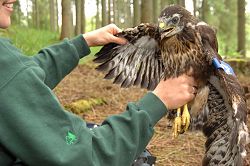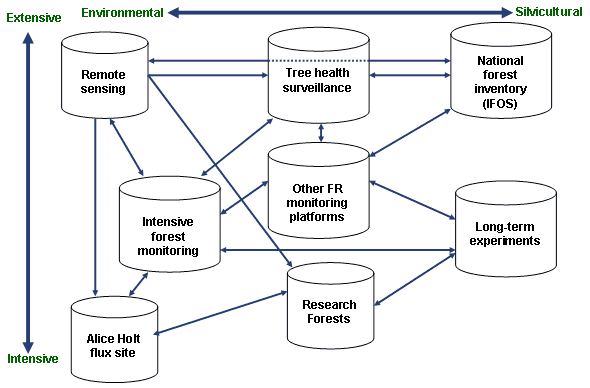Summary
Summary

Our research focuses on the interaction of people and wildlife in forests. This includes understanding the people’s attitudes towards wildlife and its management, along with the impacts that recreation has on wildlife.
Research objectives
- To identify stakeholder attitudes towards and perceptions of wildlife and its management, and the links between these and their behaviours.
- To understand the relationships between governance (e.g. legislation and policy) and future management options and needs, and stakeholder behaviour.
- To ‘map’ the development of human-wildlife conflicts.
- To promote best collaborative working practices for wildlife management and conservation (balancing government and others’ roles and responsibilities).
- To identify, locate and understand human-wildlife interactions in urban and peri-urban settings.
Results so far
 Ecological research into recreational disturbance of wildlife focuses primarily on a limited number of areas such as walking as an activity and impacts upon birds and soils. Long-term ecological studies of wildlife or habitat disturbance are scarce, and considerably less work has been carried out on the social dimensions of recreational disturbance.
Ecological research into recreational disturbance of wildlife focuses primarily on a limited number of areas such as walking as an activity and impacts upon birds and soils. Long-term ecological studies of wildlife or habitat disturbance are scarce, and considerably less work has been carried out on the social dimensions of recreational disturbance.
The majority of evidence on the relationship between recreation and conservation is focused at the site level, however assessment of these interactions should also take place at landscape scales to facilitate the wider provision of public benefits.
Collaborative wildlife management agendas across scales and social contexts are primarily set by contextual factors, particularly stakeholders drawing on specific cultures and policies, and predefining issues. The capacity of collaborative processes themselves to share power amongst stakeholders may therefore be limited.
Status
This research programme started in 2009 and is ongoing.
Reports and presentations
- Assessing the Effectiveness of Deer Management Grants in the East of England (PDF-100 KB)
Summary of research assessing the effectiveness of deer management grants in the East of England. - Recreational Use of Forests and Wildlife Interactions (PDF-224 KB)
- Is it natural? Clonal forestry in public/private spaces (PDF-942 KB)
Presentation of the social dimensions of clonal forestry, April 2009. - Human dimensions of wildlife research (PDF-1501 KB)
Presentation given to delegation visiting Forest Research from Wildlife Management Office Inc. Tokyo, Japan, 17th September 2010. - Disturbance of wildlife and the recreational use of forests (PDF-148 KB)
Research summary, November 2011. - Recreational use of forests and disturbance of wildlife (PDF-2280 KB)
Literature review report providing an assessment of the relationship between wildlife disturbance and the pursuit of recreational activities in UK forests. 2012. - Recreationist behaviour in forests and the disturbance of wildlife
Journal article reviewing the international evidence on forest recreation and wildlife disturbance, and investigating the potential for applied behavioural theory to address these problems. October 2012. - Agenda-setting and power in collaborative natural resource management. Environmental Conservation, November 2013
- Forests for All? Considering the Conservation Implications of Human-Species Interactions in the Context of Multifunctional Forestry, in Challenges and Opportunities for the World’s Forests in the 21st Century, Springer Publications, 2014.
Funders and partners
![]()
This project is funded by the Forestry Commission.
Contacts
Background

Summary
Monitoring forest state and changes to its state are an important form of scientific exploration as well as precursor to formal reporting. Forest Research (FR) has considerable experience in this field, having taken periodic measurements in forest plots since the turn of the 20th century.
Research objectives
This programme facilitates the periodic measurement of a suite of environmental, biological and silvicultural variables so that scientifically sound statements can be made on the state of selected GB forest types.
It is based on the several existing monitoring platforms listed below but will, for the first time bring these formally together to allow up- and down-scaling between them, and promote efficient data capture and exploitation:
- Forest condition plots
- Permanent sample plots (PSPs)
- Long-term experiments
- Intensive forest monitoring plots
- Biosoil plots
- Forestry Commission sponsored Environmental Change Network Site.
The Integrated Forest Monitoring Network provides coverage of environmental gradients that allow for forest ecosystem responses to climate change and pests and diseases to be evaluated. Integration of monitoring platforms will also promote cross disciplinary scientific research and facilitate modelling, essential for predictive purposes in a changing environment.
Monitoring activities

The Integrated Forest Monitoring programme is responsible for co-ordinating our monitoring activities and maximising the use of the data collected. Several monitoring platforms are part of wider monitoring networks, including:
- Environmental Change Network
- Intensive forest monitoring in support of ICP Forests
- FutMon (EU-level forest monitoring system)
- Biosoil
- Long-term experiments
Research forests
The programme also makes use of Research Forests in Britain. These are locations where a ‘backbone’ of monitoring activities can be used to support scientific studies in a known environmental context:
- Alice Holt Forest in Hampshire
- Dyfi Catchment and Woodland Research Platform in Gwynedd
- Queen Elizabeth Forest in Scotland
Publications
Publications and presentations related to intensive forest monitoring since 2000.
Funders and partners
![]()
Monitoring and associated research activities are primarily funded by the Forestry Commission Integrated forest monitoring programme. Much of the work is undertaken in partnerships with other research institutes and universities, at both national and European levels.
Forestry Commission policy
Maximising the utility of data gathered in various monitoring and survey programmes is important. This research programme directly supports the Forestry Commission’s policy of seeking to optimise the use of monitoring information for the forestry sector and wider environmental and land-use stakeholders.
Status
The programme commenced in 2009, and is reviewed every six months. Ongoing work includes:
- Collating relevant monitoring data across FR in a metadatabase
- Integrating monitoring activities with the Forestry Commission National Forest Inventory
- Executing the requirements of the intensive monitoring project
- Developing a user-friendly interface for forest science researchers.
Contact
General Content
Related pages
- Management of roe deer in the peri-urban environment
- Collaborative frameworks in land management
- Assessing and communicating animal disease risks for countryside users
- Assessing and communicating animal disease risks for countryside users
